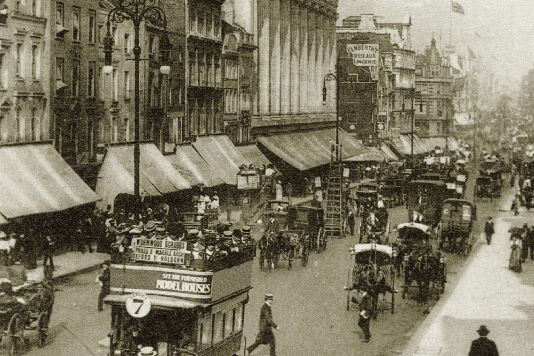Future shock: The future of food

It's back to the future as we look at 'visions of now' from the year 1900. So do we live in a brave new world or a hideous dystopia?
With Abba’s Happy New Year still echoing in their ears, many a media organisation turns to reviewing the previous 12 months. But New Year is also the time to predict the future as well as look at the past. Many periodicals and websites ask a selection of laymen, pundits and thought-shapers to speculate what the future might look like. Often they focus on things like technology, transport, medicine, but occasionally they look at diet and food.
The Ladies Home Journal did just such a thing in 1900, asking ‘the most learned and conservative minds in America’ what the year 2000 would be like. You can see the full list here. The predictions covered transport, health and society, but it’s the ones relating to food and farming that are most noteworthy. They are as follows:
Prediction 12
Peas and beans will be as large as beets are today. Sugar cane will produce twice as much sugar as the sugar beet now does. Plants will be made proof against disease microbes just as readily as man is today against smallpox.
Prediction 13
Strawberries as large as apples will be eaten by our great-great-grandchildren for their Christmas dinners a hundred years hence.
Prediction 15
No foods will be exposed. Storekeepers who expose food to air breathed out by patrons or to the atmosphere of the busy streets will be arrested with those who sell stale or adulterated produce. Liquid-air refrigerators will keep great quantities of food fresh for long intervals.
Prediction 23
Ready-cooked meals will be bought from establishments similar to our bakeries of today. Food will be served hot or cold to private houses in pneumatic tubes or automobile wagons. The meal being over, the dishes used will be packed and returned to the cooking establishments where they will be washed. Having one’s own cook and purchasing one’s own food will be an extravagance.
Prediction 24
Vegetables grown by electricity. Winter will be turned into summer and night into day by the farmer. He will also grow large gardens under glass. At night his vegetables will be bathed in powerful electric light, serving, like sunlight, to hasten their growth.
Prediction 28
There will be no wild animals except in menageries. Rats and mice will have been exterminated. The automobile will have driven out the horse. Cattle and sheep will have no horns. They will be unable to run faster than the fattened hog of today. A century ago the wild hog could outrun a horse. Food animals will be bred to expend practically all of their life energy in producing meat, milk, wool and other by-products. Horns, bones, muscles and lungs will have been neglected.
A hundred years of progress?
From the viewpoint of the early twenty-first century some of this sounds like hell on earth, yet some of it sounds scarily like now. There are two things to take from this. Firstly, the assumption that the extermination of wild species seems to be a given – especially insects. If you look at the world now, important pollinating species like bees are under threat from loss of habitat and colony collapse disorder while flies and mosquitos are having a whale of a time living in our filth and killing millions worldwide.
Bigger is better
The second point worth noting is that the food described is massive. Farm animals are hornless and grotesquely deformed to produce more meat. Vegetables are all gigantic and climate-resistant. The prediction about strawberries is like some unseasonal Alice in Wonderland image. Until you realise it’s actually very nearly true. The Dutch Elsanta strawberry is a whopper, grown more for its shelf-life than its flavour, and is available 365 days of the year in most supermarkets. Prediction 15 has also very nearly come true, as a large amount of food today is shrink-wrapped and sealed.
So where now for the future of food? Fruits as big as your head all year round? Or economic collapse and species extinction? Well, maybe both. Food still comes way down the list in a lot of people’s lists of things that ‘are important’ – that is until we all start to get a little hungry.
What are your thoughts on the future of the food we eat?
More things you might like to read
The traditional way to celebrate Chinese New Year
BBC Radio 4 Food & Farming Awards videos
Comments
Be the first to comment
Do you want to comment on this article? You need to be signed in for this feature